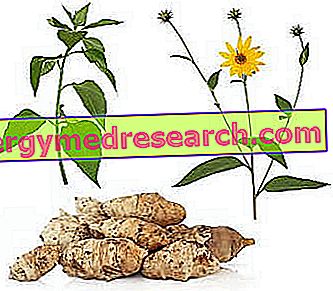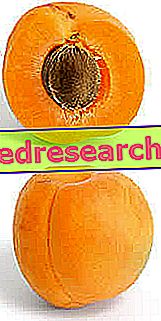Introduction
They speak of Jerusalem artichoke as a now forgotten tuber: if few people know it as a food, they are even less those that give it a certain phytotherapeutic importance.
In the course of the article we will give a general description of the Jerusalem artichoke, trying to appreciate the hidden but numerous properties of this very special vegetable.

Generality
Jerusalem artichoke is a perennial herbaceous plant native to North America (Canada in particular), quite appreciated also in Italy for human nutrition and, above all, for livestock.
At a glance, the Jerusalem artichoke can be mistaken for a more globulose and hard potato: the differences with the tuber par excellence do not end there. In fact, Jerusalem artichoke is less nutritious than potato, as well as containing an important amount of inulin, to the detriment of starch. And it is precisely the scarcity of starch that penalizes the Jerusalem artichoke: in fact, the cultivation of this tuber has clearly diminished to the advantage of the most productive and starchy vegetables.
Name analysis
According to the nomenclature of Linnaeus, the Jerusalem artichoke is Helianthus tuberosus ; vulgarly, it is also called cane truffle (affinity for form), potato of Canada, artichoke of Jerusalem (affinity for taste) or, again, German turnip (although it has nothing to do with common turnips).
The bizarre and singular scientific name, recalls a particular behavior of the flower of Jerusalem artichoke: the genus ( Helianthus ) refers to "sun" ( helios, in Greek), and "flower" ( anthos in the Greek language). The juxtaposition of the word sun-flower refers to the propensity of the flowers (or, more precisely, of the flower heads) to reach out towards the sun.
Botanical analysis
The Jerusalem artichoke belongs to the Compositae Tubuliflorae family: it is a perennial herbaceous plant whose stem can reach 2 or 3 meters in height and, in the apical part, is bristly. The leaves are both alternate and opposite: in the lower part of the stem they are generally alternate, while the opposite ones are found in the upper part; still, the leaves, very sharp and pointed, have serrated edges and a dark green rough surface, lined with marked veins. The yellow flowers, similar to sunflowers, turn to the sun, following the way with the flower heads: not surprisingly, the flowers of Jerusalem artichokes are often mistaken, in fact, for sunflowers.
The Jerusalem artichoke is cultivated, clearly, for the tuberized root (the roots are very ramified and are provided with tuberiferous rhizomes): it is globular, has a squat shape and is wrapped in a rather rigid and clear film.
The Jerusalem artichoke plant is not very demanding in terms of environment and soil: it adapts, in fact, to all climates, although it prefers temperate-warm ones, and grows easily in any type of soil, from the most arid, to the most humid.
Nutritional values
As we have seen, the Jerusalem artichoke falls erroneously among the "forgotten" tubers: the food, in fact, not only provides very few calories (approx. 30 Kcal per 100 grams of product), but it is mine of inulin (up to 60% of the weight dry), which makes it particularly suitable for diabetics. Not surprisingly, it has been observed that the glycaemia, following a meal of Jerusalem artichokes only, remains unchanged: this means that the pancreatic gland is not stimulated to produce insulin to balance the rate of glucose in the blood. [taken from antioxidant foods. Eat well to prevent and fight the disease, by Johannes F. Coy, Maren Franz]
Jerusalem artichokes are made up of a good quantity of water (80%), 15-20% of carbohydrates (including fructose, capable of not affecting pancreatic activity), 2% of vitamin A and traces of B vitamins, salts minerals (iron, potassium, silicon, phosphorus, magnesium) and amino acids such as asparagine and arginine. According to the studies of prof. Boas, Jerusalem artichoke is a source of biotin (vitamin H), very important in the prevention of physical fatigue, muscle pain and loss of appetite [taken from //www.topinambur.it/]
Food Uses
The Jerusalem artichoke is generally prepared according to the same methods as potatoes: it can be boiled in abundant salted water or, even better, steamed, lending itself to the preparation of tasty - and at the same time simple - side dishes; alternatively, it can also be cooked in a pan or fried.
After cooking, either in water, in a pan, in the oven or in oil, the taste of Jerusalem artichoke is delicate and sweet: as described in the beginning of the article, another name with which the topinambur is known is “artichoke Jerusalem ": this association of vegetables is not accidental, since the taste of Jerusalem artichoke is in some ways similar to that of the artichoke.
Finally, topinambur can also be used raw, grated directly in salads. By adding a little lemon to the finely sliced or grated Jerusalem artichoke pulp, the inulin effect is enhanced.
It is good to remember that the external envelope that surrounds the tuber is very digestible, therefore it is not recommended to eliminate it.
Topinambur Trifolati - How to Clean and Cook Topinambur
X Problems with video playback? Reload from YouTube Go to Video Page Go to Video Recipes Section Watch the video on youtubeProperty
Also Jerusalem artichoke is one of the vegetables expertly exploited by phytotherapy: as already extensively discussed, this tuber should be appreciated above all by diabetics for the consistent amount of inulin present. But the hidden beneficial properties of Jerusalem artichoke do not stop there: its roots, typically tuberized, are considered galactogenic, therefore able to increase and promote the secretion of milk in women who breast-feed their baby. Furthermore, the Jerusalem artichoke extract is very useful in case of overweight, becoming a valid aid for weight loss: not surprisingly, the consumption of Jerusalem artichokes not only facilitates digestion, but also favors the feeling of satiety, curbing uncontrolled attacks of hunger.
Of the Jerusalem artichokes, the leaves are also exploited, useful for lightening the problems related to heart failure. [from A. Bruni's Dictionary of herbal medicine and phytotherapy ]
In general, Jerusalem artichoke is considered a tonic, stomachic, cholagogue and diuretic drug.
Again, Jerusalem artichoke does not form gluten, therefore it is suitable for celiac diets.
SIDE EFFECTS
Due to the high concentrations of inulin, taking Jerusalem artichokes can cause meteorism problems and excessive flatulence. To limit the phenomenon, the intestine should be accustomed gradually starting with the consumption of small portions, to be increased then with the passage of time.
Jerusalem artichokes in brief, Summary on the properties of Jerusalem artichoke »



